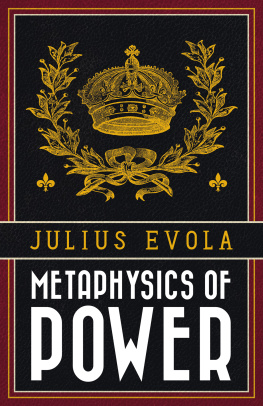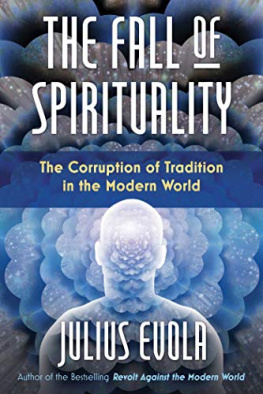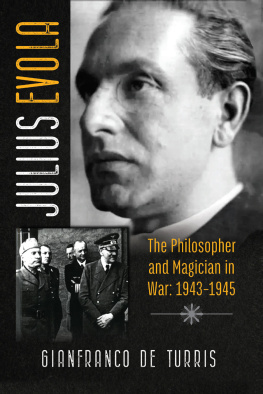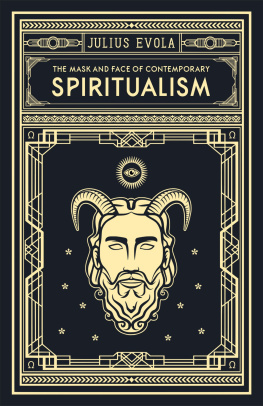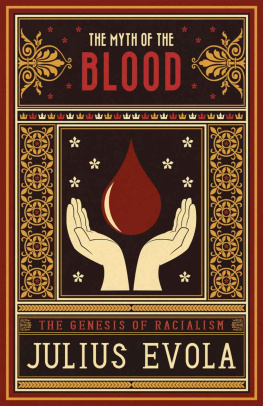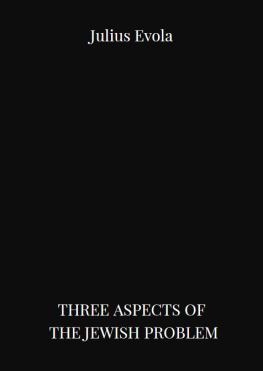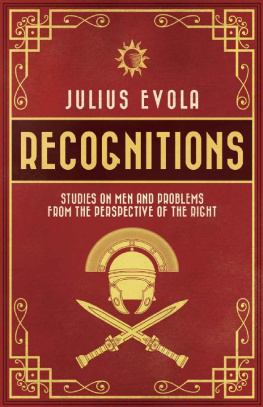Frank Julian Gelli - Julius Evola: The Sufi of Rome
Here you can read online Frank Julian Gelli - Julius Evola: The Sufi of Rome full text of the book (entire story) in english for free. Download pdf and epub, get meaning, cover and reviews about this ebook. year: 2012, publisher: Amazon Digital Services, Inc., genre: Non-fiction / History. Description of the work, (preface) as well as reviews are available. Best literature library LitArk.com created for fans of good reading and offers a wide selection of genres:
Romance novel
Science fiction
Adventure
Detective
Science
History
Home and family
Prose
Art
Politics
Computer
Non-fiction
Religion
Business
Children
Humor
Choose a favorite category and find really read worthwhile books. Enjoy immersion in the world of imagination, feel the emotions of the characters or learn something new for yourself, make an fascinating discovery.
- Book:Julius Evola: The Sufi of Rome
- Author:
- Publisher:Amazon Digital Services, Inc.
- Genre:
- Year:2012
- Rating:5 / 5
- Favourites:Add to favourites
- Your mark:
- 100
- 1
- 2
- 3
- 4
- 5
Julius Evola: The Sufi of Rome: summary, description and annotation
We offer to read an annotation, description, summary or preface (depends on what the author of the book "Julius Evola: The Sufi of Rome" wrote himself). If you haven't found the necessary information about the book — write in the comments, we will try to find it.
Julius Evola: The Sufi of Rome — read online for free the complete book (whole text) full work
Below is the text of the book, divided by pages. System saving the place of the last page read, allows you to conveniently read the book "Julius Evola: The Sufi of Rome" online for free, without having to search again every time where you left off. Put a bookmark, and you can go to the page where you finished reading at any time.
Font size:
Interval:
Bookmark:
JULIUS EVOLA: THE SUFI OF ROME
This is the disciple who is bearing witness to these things, and who has written these things; and we know that his testimony is true . St John, 21:24
Enter thou, then, amongst my Devotees. Quran, 89:29
PROLOGUE
In Jorge Luis Borges short story, The Approach to al-Mutasim , the nameless protagonist , a fugitive Muslim student, searches for a remote person, a man or more t han a m an - called al-Muta sim. A messiah , perhaps, or a magus, or the m aster of an arcane , heavenly fraternity. The way the young man has intuited al-Muta sim existence is problematical , as it befits its enigmatic subject . Borges writes of th e subtle reflections the person of al-Mu tasim has left on others, even the lowest, most des picable characters. And yet, such trifling traces are enough to make the hero set out on his quest. Years go by. After an odyssey of vertiginous adventures in the Indian subcontinent the searcher does at last attain his ineffable goal , although the reader remains tantalisingly ignorant as to the precise nature of the murky al-Muta sim.
The hero, or anti-h ero - take your pick - of this book is not quite like the elusive character conjured up by Borges fantasy . His identity is all too well-known. Unlike the hidden al-Muta sim, Julius Evola s friends and disciples found it easy to approach him, confined as he was to a wheelchair in his attic in ce ntral Rome. Nonetheles s, I believe this very exposure has tended to obscure E volas true meaning and character . As opacity and distance blurred and concealed the person of al-Mut asim, so proximity and publicity have obstructed Evola s genuine recognition. In a nutshell, he was misunderstood. That is why this writer feels a bit like the searcher in Borges tale. One difference is that the figure searched for is not generally considered saintly but satanic. For so many, Evolas reputation is indeed so infamous that my task is beset with dangers I am fully aware of that. I also realise h ow some will perhaps judge me as blam eworthy as my subject. (Indeed, like the runaway student I too have long been in fli ght, I too have tro d den the paths of infamy. .. ) But at least I can claim to know the extraordinary figure I write about. The innumerable reflections he has left on my soul have led me to pen these Erinnerungen . I have done so in order to put the record straight. To tell the truth or what I believe to be the truth about Julius Evola . I owe it to the man whom, in hindsight, I have come to regard almost as a mentor and who m , I believe or I like to believe consider ed me like the lost son he never knew.
Julius Evola. No t quite th e tenebrous magus mythologised and maligned by his many enemies, but, like Borges a l-Muta sim, a n intriguing, spell-binding teacher . To paraphrase Rene Guenon, verily Evola was a n implausible but actual Roi de Rome .
INTRODUCTION
Julius Evola was , like me, a Roman, a Roumi , to use the Arabic fo r it. Unlike me, Evolas name has become a byword for things, ideas, orientations that are heretical, loathsome and abom inable to our Zeitgeist. He was accused, like Socrates, of being a corrupter of youth . That was because of a cult following amon gst young men on the f ar r ight , including even a few terrorists . But that was not all. Equally outrageous is Evola the occult ist, the magician, the sinister figure endowed perhaps with supernatural power to kill at a distance, as even Mussolini believed. He had known Himmler , and had lectured in the castles of the Schutzstaffel Order. Evola, a man under a curse. The very mention of his name bring s danger. It might make you suspect, bring you discredit and disgrace , cause you to lose your job, be prosecuted, physically attacked ... und so weiter .
Yet the thesis of this book is that Julius Evolas deeper , true ideas were somewhat disguised in his works. Or, rather, openly display ed , so that the discerning reader might surmise the joyful truth. Like the stolen missive in Edgar Allan Poes The Purloined Letter , Evolas true , unknown personality and beliefs are hidden - hidden in plain view. I ndeed , that is the best hiding place, as most people are dazzled by the obvious. To my knowledge, I am the fi rst one who has divined this . Is this presumptuous? Maybe, but I believe it is true.
Evola was a Sufi. Or, better, a crypto-Sufi . A hidden, self-concealing follower of the path of Tasawwuf . A mystical , if heretical, master in the Islamic tradition. Rene Guenon, that occult French writer and convert to mystical Islam, had secretly initiated him int o a Sufi fraternity. Evola came close to admitting that at times. Like many Sufis, he often taught not directly but by hints , allusions and suggestions. The clues to his authentic views are dissemi nated through his writings, and more openly and blatantly in the conversations he had with me. He took a wicked pleasure in upsetting right-thinking, conventional and dull people, both of the Right and of the Left. Yes, he enjoyed being contrary, perverse, also sh ocking his admirers and friends .
Of course, it was a dangerous game. It meant exclusion, alienation from intellectual circles and spheres of power. Indeed, even dur ing Mussolinis regime , one that perhaps approx imated his outer views, Evola was barred from having any real influence. I suspect that was intentional . It was a daring strategy , one that courted contempt, rejection and persecution, but it was his own way.
Sufis are a large , confusing and mixed bag of tricks, some quietist and contempla tive, others activist, fierce and war-like. Evola , I believe , belonged to perhaps the most outrageous, far-out type of all. The m alamatiya , the p eople of blame. N o detailed knowledge of what such sect teaches is extant bec ause the available source material is sketchy and contradictory but this is clear : the m alamatiya delibe rately flaunt conventions. They indulge in conduct that br ings them shame. That has nothing to do with things pathological, such as masochism. Rather, i t is the outcome of a genuine spiritual vocation. There are analogies in Christianity, amongst the Desert Fathers of Egypt , for example . Sufi mystics desire to draw close to the Divine even to annihilate themselves ( fana ) in God. Because of that, they live dangerously. So did Evola. But the seeming paradox posed by some of the more atrocious of his outer teachings, such as certain racial views , I hope can be reconcile d when we see it for what it really was: part of a self-chosen, arduous Sufi spiritual path . A self-abasement, a lowering of oneself in the service of what was a higher, necessary stage , he felt, in t he journey towards immortality. Of course, h e hardly ever used the word God positively in his teachings , because of the crudely perso nal connotations that term has acquired in popular monoth eism. He preferred to speak of T rans cendence, of what is higher - surely a different way of expressing the same thing.
Despite his exal tation of the military caste, Evola was not a man of overt action. Hence his m alamatiya posture was conve yed largely through his works and private talks . I n the books the reader finds frequent references to secret Sufi circle s . At times he gestures towards the Shia strand of Islam. I am morally certain he had had direct experience of Sufism through R ene Guenon and through another , nameless master . Meetings during my trips to Cairo were a confirmation of that. He told me again and again of his admiration for the esoteric teachings of Twelver Shiism , and the figure of the Imam al-Mahdi. Before he died, he also prophesied an imm inent resurgence of Islam. As we know, he was right.
Evola the heretical Sufi. Evola the Islamic initiate. A thesis that will ann oy many people, I am sure. Especially among the R ight, in whose ranks Evolas disciples are still not insignificant. The reason is that the European R ight has made anti-Muslim agitation one of its main political planks. I believe Evola would say that they are wrong in that. I also believe the evidence for Evolas unorthodox Sufism is overwhelming. This book sets out to show it.
Next pageFont size:
Interval:
Bookmark:
Similar books «Julius Evola: The Sufi of Rome»
Look at similar books to Julius Evola: The Sufi of Rome. We have selected literature similar in name and meaning in the hope of providing readers with more options to find new, interesting, not yet read works.
Discussion, reviews of the book Julius Evola: The Sufi of Rome and just readers' own opinions. Leave your comments, write what you think about the work, its meaning or the main characters. Specify what exactly you liked and what you didn't like, and why you think so.


